With this update, we’re opening the gate into the future of work for service-based firms! Introducing: Scoro’s MCP server – one of the first of its kind in the professional services automation space. Read below to find out what that means and how it puts you and Scoro at the forefront of the AI workflow revolution.
Of course, we haven’t forgotten about “business as usual” either. In addition to our AI developments, we’ve also improved timesheet management with reminders, added tags to custom modules, and made several UX improvements across the site.
Check out what’s new in Scoro!
Scoro’s MCP server – for early adopters
We’re excited to introduce a powerful new way to work with Scoro: the Scoro MCP server. We are among the first in the PSA space to launch our own MCP (Model Context Protocol – more on that below) server.
In simple terms, it’s something that enables you to connect Scoro to AI tools like Claude and ChatGPT.
This opens up a new world of possibilities for your business: you can use simple, natural language prompts to pull data from Scoro, ask AI to perform actions for you in Scoro, or even orchestrate Scoro-related workflows across multiple tools and apps – all directly from an AI chat of your choice.
What exactly is MCP?
The Scoro MCP is our hosted server that allows other AI tools to securely access your Scoro workspace. MCP stands for Model Context Protocol, which helps external AI agents work with your Scoro site and data.
You can think of MCP as a “translator” that opens Scoro up to the wider AI ecosystem, enabling secure information flow across different AI apps and databases. Thanks to MCP, cross-app actions that used to require custom development or complex API calls can now be carried out via plain-English prompts in your favourite AI chat tool.
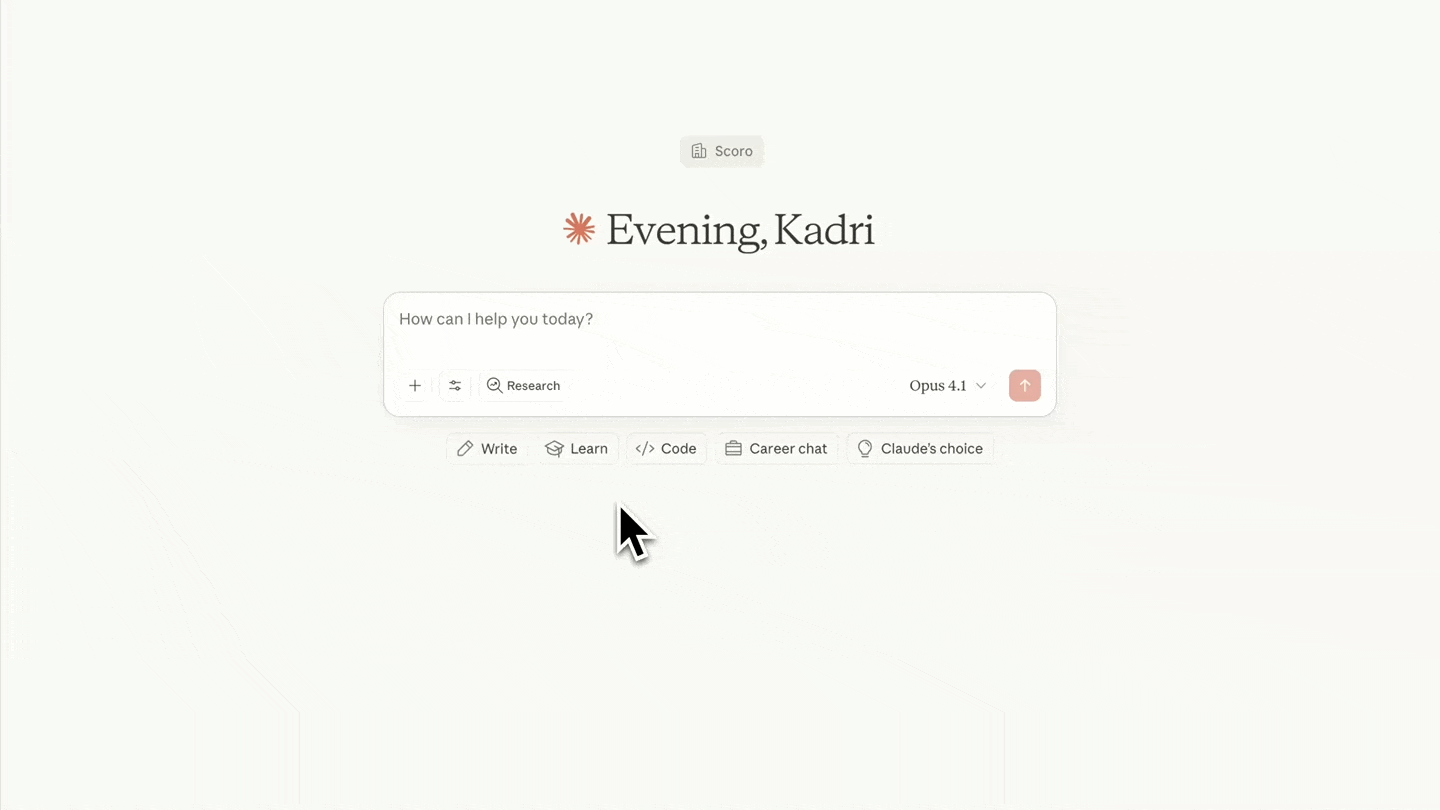
How does it help you?
Scoro MCP opens up two powerful new possibilities for all Scoro users:
- Work directly from your AI chat: connect Scoro with a large language model (LLM), such as Claude or ChatGPT, and use natural language to pull information from Scoro or let AI create projects, tasks, comments, and more in Scoro, all without leaving your AI chat.
- Orchestrate multi-tool workflows: use Scoro as part of broader, multi-tool workflows. For example, pull data and context from Slack, Notion, Google Drive, and Scoro, then delegate actions across all of those tools with a single prompt.
Let’s look at example use cases to illustrate how it works.
Example use case 1:
Example use case 2:
Example use case 3:
These are things you can already do with the Scoro MCP server. The possibilities for the future are endless.
How to set up the MCP server?
Note!
Scoro MCP is currently available only for early adopters.
Fill out this form to register your interest and we’ll get in touch with you. Request should be submitted by a site admin.
You can find more info about the setup from our Help Center.
What about security?
We take data security very seriously. The Scoro MCP server is designed with your safety in mind:
- Secure connection – all communication is encrypted using industry-standard protocols.
- Authentication – the connection is tied to your Scoro account permissions; AI tools can only access what you can access in Scoro.
- No direct database access – AI tools don’t see your full database. They can only use the specific Scoro tools you’ve enabled (for example: create tasks, update events, search contacts) and only when you allow it.
In short: you stay in control of what AI can see and do in Scoro.
Current limitations
The MCP is still in beta, so it comes with a few limitations that we expect to improve in the near future.
- The first version of the MCP toolset focuses on key actions related to tasks, projects, and search. We’ll be expanding it to resourcing and finance-related actions gradually as we work on our API. Simply put: if some action isn’t available today, it might already be available tomorrow as we’re improving it continuously.
- Output quality is LLM-dependent and varies by model. Based on our testing, we recommend using Claude and the Opus 4.1 model for the best results. Early-stage version means users may encounter some misinterpretations, unexpected behavior, or partial results due to how LLMs interpret prompts.
- We’ve opted for a creation-first approach, meaning at this stage, you can primarily pull data and create items. Modifications are limited, and deletions are not allowed to prevent issues if the LLM misinterprets a prompt.
We are committed to giving our early adopters the best experience possible and are eager to hear your feedback.
We can’t wait to see what you’ll build with it! 🚀
Timesheet reminders
Say goodbye to manually chasing down unsubmitted timesheets. We’ve made it easier than ever to keep your time data accurate and lock it in on time with automated timesheet reminders that notify users about any unsubmitted timesheets within the past eight weeks.
You control the setup:
- Decide when to send reminders: choose a specific day of the week and time for Scoro to automatically check for unsubmitted timesheets and send out emails.
- Choose relevant recipients: you can choose to send out reminders to all users who haven’t submitted a timesheet or specify certain users or user groups only. For example, if only specialists have to submit timesheets, you can ensure only they get the reminders.
- Send reminders instantly: if you want to send out a reminder outside of the defined schedule, you can do it manually at any point by clicking Send a reminder now.
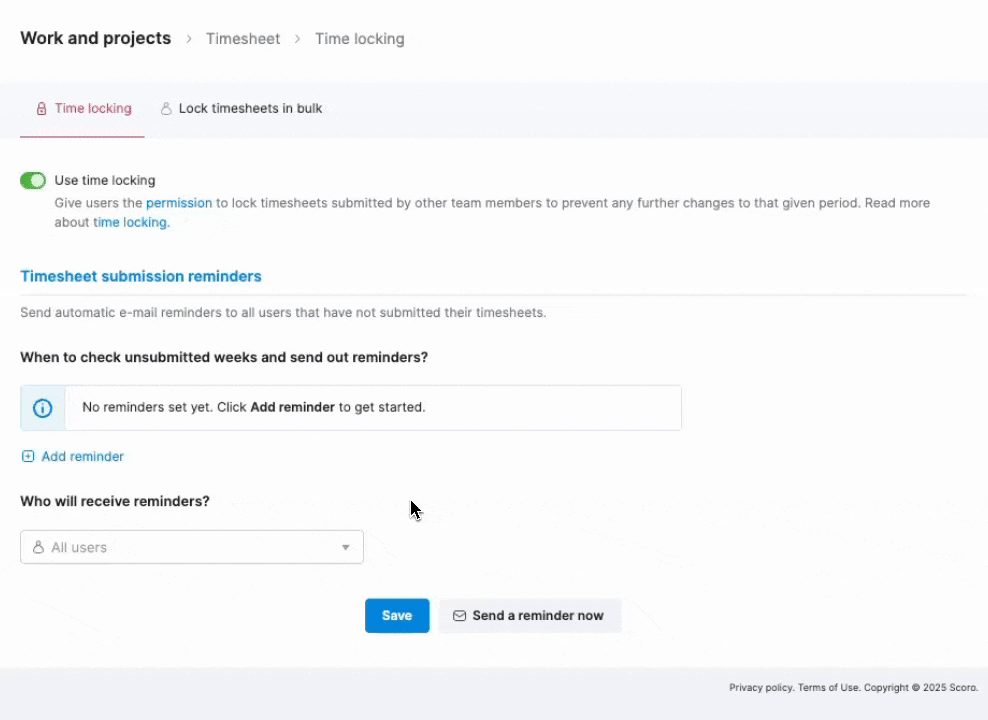
The email that goes out includes a list of missing timesheet weeks and direct links to the corresponding timesheet views.
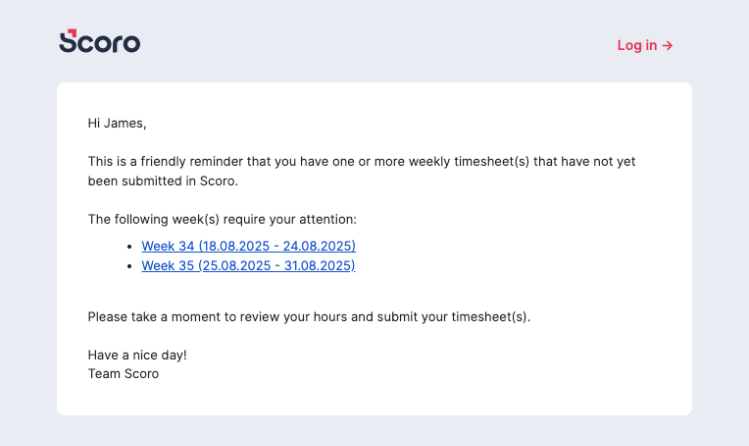
To schedule reminders, navigate to Settings > Work and projects > Timesheet.
Timesheet reminders are available for all sites that have time-locking enabled, which is included in Enterprise and Ultimate plans, as well as our legacy Pro and Ultimate plans.
Read more about timesheet reminders.
Collapsing the time breakdown chart
We recently added a Time breakdown by roles chart into the task view to help you compare planned time and done time against the time budget on a role level. However, as the task view is used by project managers and specialists alike, this information might not be relevant for everyone. Therefore, we’ve added an option to collapse this section. Scoro will remember each user’s preferred setup across all task views.
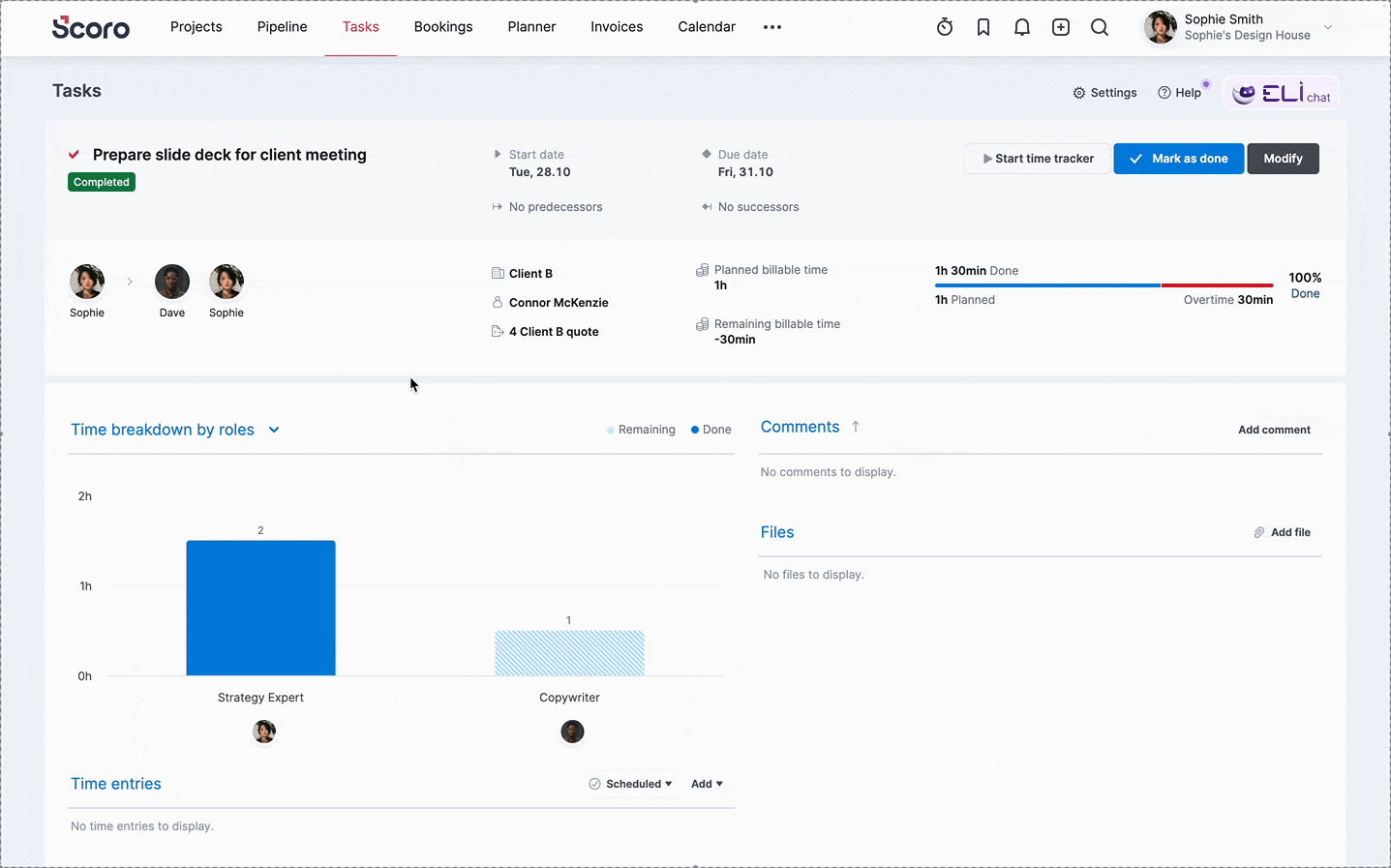
Filtering views by project type
We’ve added the project type filter to the following views in Scoro to make it easier to filter out data only for retainers, one-off, or internal projects and improve insights:
- In the Revenue report, you can use this filter to exclude internal projects, allowing you to focus only on revenue-generating work.
- In the WIP report, filtering out internal projects or separating retainers from one-offs helps you get a more accurate overview of how certain types of projects are progressing.
- In the Bookings module, the project type filter makes it easy to separate internal projects from client ones, giving you better visibility into billable vs non-billable utilization levels.
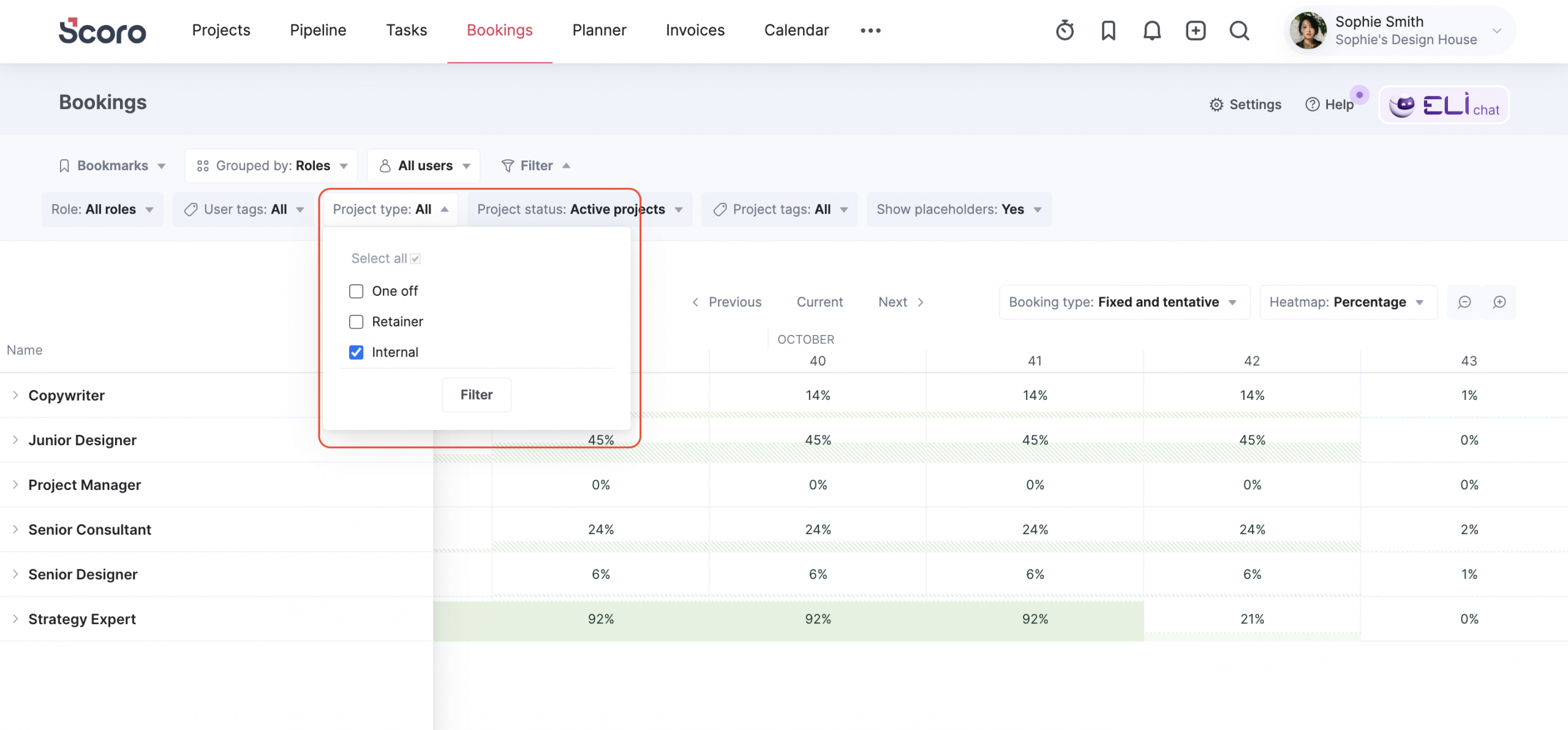
Managing bookings across entities
We’ve made it easier to manage bookings across different entities. The Bookings module now provides a clear overview of cross-entity workloads by showing all of a user’s or a role’s projects, regardless of which entity they belong to, while access controls remain in place.
Key improvements:
- Utilization consistency: user and role utilization now considers bookings across projects from different entities.
- Heatmap details: hover-overs show you the project name and the client for context, even if the project belongs to a different entity.
- Comprehensive overview: all projects and bookings across entities are listed under each user in the Bookings module, regardless of access rights.
- Access validation: attempting to open a project outside your entity still respects sharing rules.
Tags for custom modules
You can now create tags for your custom modules just like for any default modules and views in Scoro.
First, enable the tags for your custom module – go to Settings > Site settings > Custom modules, modify your custom module, and tick the Use tags checkbox.
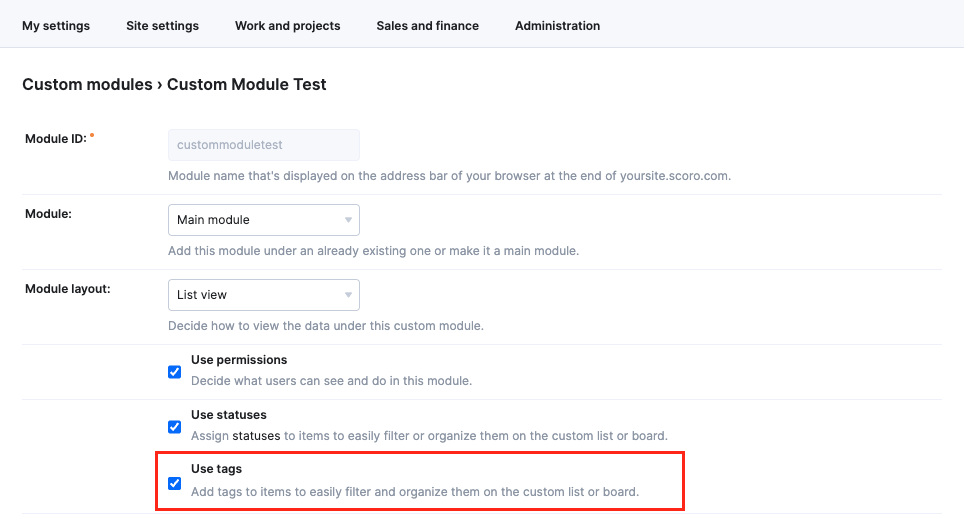
Then, go to Settings > Site settings > Tags and relations, open your Custom module tab, create the tags, and group them as needed. You can also pick a color for your tag based on your color coding system.
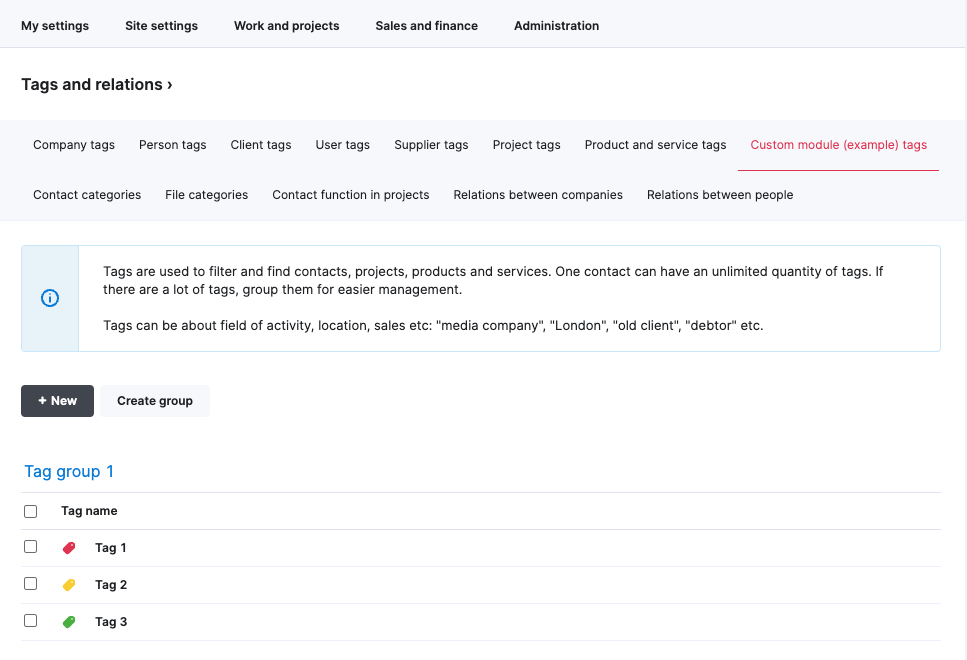
Other…
Custom data sync frequency for QuickBooks
You can now customize the automatic data syncn frequency for the QuickBooks integration. Previously, automatic sync ran every 5 minutes, and it was not configurable. Now you can set the sync to run either once an hour, day, or week.
Importing billable time entries
We’ve improved the way billable type is handled when importing time entries. Up until now, Scoro prioritized the task’s billable amount over the billable type defined in the import file. For example, if time entries were imported as billable, then any entries that exceeded the task’s billable budget were automatically marked as non-billable. To ensure data integrity upon historical import, the billable type of the imported time entry is now treated as the source of truth, overriding the task’s billable duration, if necessary.
Updates to packages – individual labor cost & prompts for ELI insights
We’ve got some great news for our higher packages:
- Individual labor cost, which allows you to define labor cost at a user level, is now available starting from the Performance plan.
- All our Pro, Performance, Ultimate, and Enterprise packages now include 100 free prompts by default, so you can take advantage of ELI insights and ask for data in natural language.
We’re working on…
- Subtasks. Break down more complex project deliverables with multiple contributors into smaller, actionable subtasks to gain complete oversight of your project’s moving parts and monitor the progress with precision.
❗Don’t worry if your Scoro site hasn’t been updated yet – the update is rolling out gradually over the next few weeks.
We do our very best to make Scoro better every day, so we appreciate your feedback! Share your thoughts with us via our contact form.
Wishing for your improvement ideas to come to life on your Scoro site? Send us feedback.
What to do next?
- Join our referral program to invite others to try out Scoro and earn monetary rewards of up to 1800 USD when they become a Scoro customer!
- Visit our Help Center to find in-depth guides about all Scoro features.
- Listen to our podcast The Handbook by Harv Nagra, an Ops Consultant and Ex-Agency Leader, where he dives into engaging conversations with operations experts to discuss and explore the behind-the-scenes and latest trends and innovations in the professional services space.
- Subscribe to The Handbook newsletter to get the latest info on agency challenges and solutions delivered directly to your inbox.





